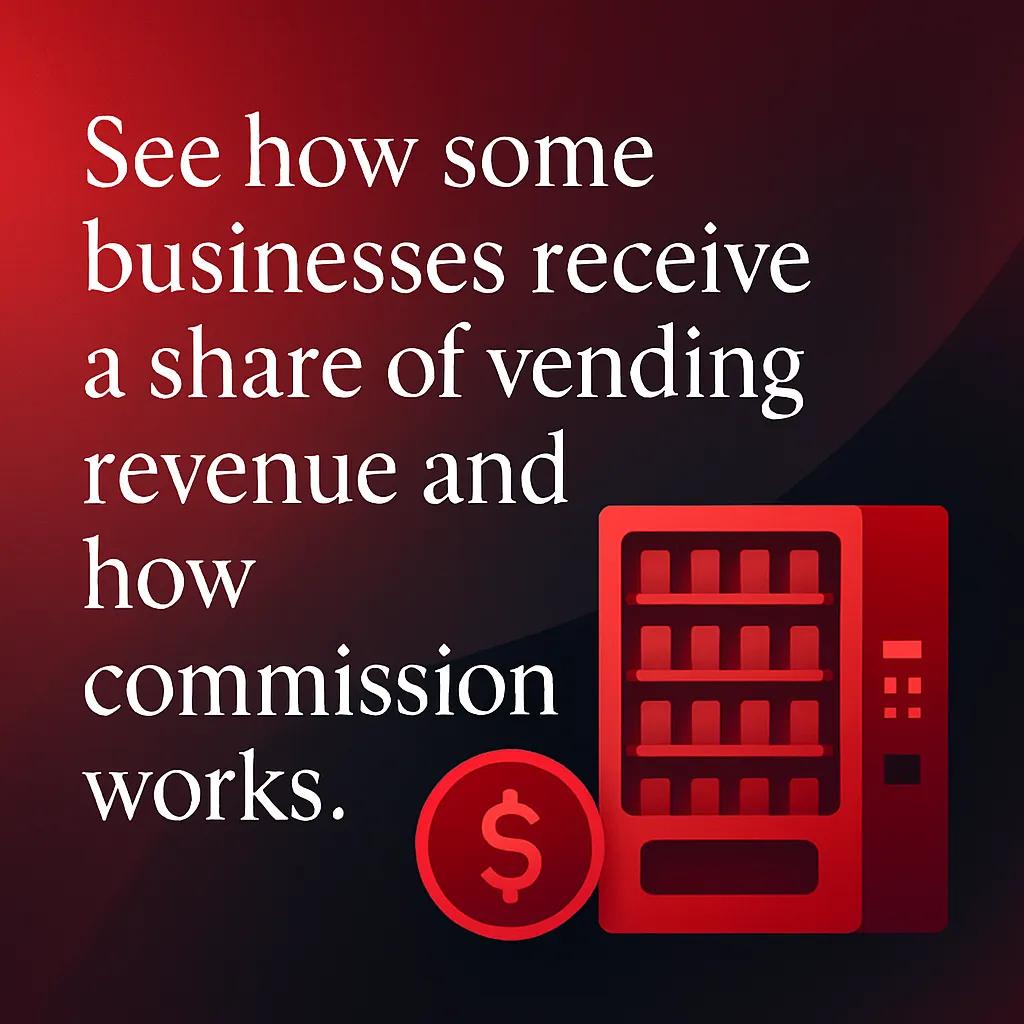Do Businesses Earn Commission from Vending?
See how some businesses receive a share of vending revenue and how commission works.
Back to Vending FAQs ResourcesSee how some businesses receive a share of vending revenue and how commission works.
Back to Vending FAQs ResourcesBusinesses with high foot traffic or significant employee counts often have the opportunity to earn a percentage of sales from vending machines placed on their premises.
![]() Generate passive income with a cut of every sale
Generate passive income with a cut of every sale
![]() Enhance amenities for employees and customers at no cost
Enhance amenities for employees and customers at no cost
![]() Negotiate favorable terms based on your location's sales potential
Negotiate favorable terms based on your location's sales potential

Many businesses can indeed earn a commission from vending machines placed within their establishments. This revenue-sharing model allows companies to benefit financially from providing convenient access to snacks, beverages, and other items for their employees, customers, or visitors. The core principle is simple: the vending machine operator places and maintains the machine, and the business receives a percentage of the sales generated.
The commission structure is typically outlined in a vending service contract. This agreement details the commission rate, which can vary significantly depending on several factors. Key determinants include the volume of expected sales, the type of products offered, the location's foot traffic, and the negotiating power of the business. High-traffic areas like large manufacturing plants, busy offices, or public venues are often in a strong position to negotiate favorable commission rates.
For some businesses, particularly those with consistent demand, vending commissions can represent a steady, passive income stream. This arrangement also removes the burden of managing inventory, maintenance, and cash collection, as these responsibilities fall entirely on the vending provider. Beyond the direct financial benefit, offering vending machines enhances the overall experience for those on the premises, improving satisfaction and productivity. Businesses interested in exploring this option should consider understanding the nuances of common vending contract clauses to ensure a transparent and beneficial partnership. It's important to differentiate this model from simply getting a free vending machine, where the provider retains all revenue in exchange for providing the amenity at no cost to the business. Both models offer benefits, but commissions provide a direct financial return.
Ultimately, whether a business earns commission from vending machines comes down to the specific agreement negotiated with the vending service provider. It’s a mutually beneficial relationship where the provider gains a location for their machines, and the business gains a valuable amenity that can also be a source of income. If you're considering adding vending machines to your location, understanding the potential for commission is a crucial step. Researching how much vending services cost and what typical revenue shares look like can help set expectations.
No, not all businesses earn commissions. This often depends on factors like foot traffic, sales volume, and the specific agreement with the vending provider.
Vending commission is usually calculated as a percentage of gross sales or a fixed amount per item sold. The percentage can vary widely.
Factors include the location's foot traffic, sales potential, product pricing, machine type, and the negotiating power of the business or location owner.
Yes, many businesses can get free vending machines where the provider handles everything, and the business doesn't necessarily earn commission but benefits from the amenity.
This depends on the business's priorities. Earning commission generates revenue, while a free machine provides a convenient amenity without host management responsibilities.
High-traffic locations like large offices, manufacturing plants, public venues, and residential complexes with consistent sales volume are often good candidates for commissions.
Commission payouts can vary, but they are typically paid monthly or quarterly, depending on the terms outlined in the vending service contract.
Yes, a vending service contract will outline all terms, including commission rates, payment schedules, service responsibilities, and contract length.
In many cases, businesses with high foot traffic or unique location advantages can negotiate higher commission rates with vending providers.
Businesses should look for clear commission rates, detailed sales reporting, reliable payment schedules, and clear terms regarding service and maintenance.